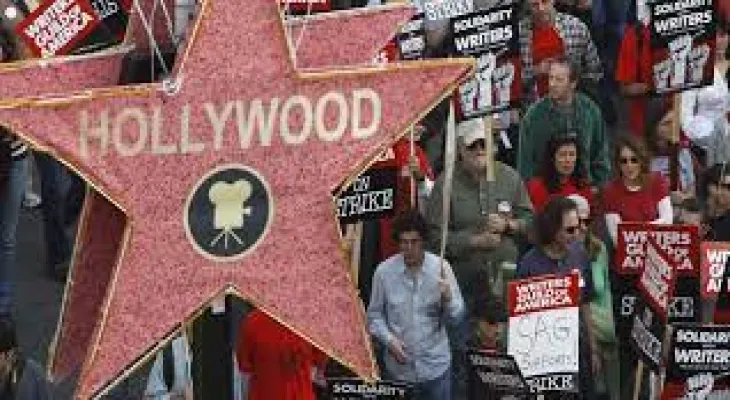Search here
Newspaper
Search here

Arab Canada News
News

Published: July 16, 2023
Hollywood sidewalks and Midtown Manhattan are crowded with actors on the first day of their strike, protesting alongside writers who have been participating since last May.
The two unions together halted the entertainment industry, and despite that on both sides, there was a refreshing mood in the air as picket lines were supported by some of the 65,000 actors who make up the American Federation of Radio and Television Artists, (98% of members voted to approve the strike again in June).
This is the biggest labor battle in Hollywood in six decades, and the first double strike since 1960, reigniting enthusiasm against the Alliance of Film and Television Producers just as a historic heatwave hit Southern California.
Outside the "Warner Bros" studios in Burbank, California, crowds of protesters chanted "Raise the fist, the curtains, Los Angeles is a union town," food trucks surrounded the organizers' tents providing Cross, boba tea, and cold lemonade for protesters baking in the midday heat that reached (36 degrees Celsius).
But the scorching sun did not dampen the mood, as protesters sprayed water on each other and danced to the tunes of reggaeton music while passersby in cars honked in support of signs like "Honk if your boss is overpaid."
Parents on the picket line lifted their children onto their shoulders and pushed their toddlers in strollers, raising their voices to each other with signs reflecting defiant words from Olivia Rodrigo’s new single "vampire" and were singing.
Fran Drescher, president of the American Federation of Radio and Television Artists, said on Thursday during a press conference, "The entire business model has been changed by digital streaming and artificial intelligence. If we don’t act and stand tall now, we will all be in trouble."
Comedian and writer Adam Conover, a member of the American Federation of Artists and the Writers Guild, who works on the artists' union negotiation committee, noted member support, saying, "If you build momentum like we’ve had 70 days of striking, you will win. You know the companies' strategy with the writers' union when we go on strike is to starve us out and wait, and not even talk to us for months because they expect us to bleed support, yet look at these picket lines, they are fuller than ever and now we have another union on strike with us."
Conover continued, "What we won in 1960 were our health plans and pensions, and the existence of the leftovers, but now, executives face the fact that they don’t just not get new scripts, they can’t shoot anything until they come back and make a fair deal, not with one union but with both unions."
Zora Bikangaga, who is also a member of both unions, described Friday’s picket as invigorating and a testament to how widespread the issues facing writers are "throughout the entire industry."
While the business model in the industry has undergone major changes in the decades since the last strike, actors say their rates and contracts have not evolved to fit inflation and other changes.
Actor Ron Sung, who appeared on Amazon Prime's "Duty of the Arbitration Committee," nominated this week for four Emmy Awards, said.
Former stars and acquaintances gathered at the demonstrations, some of whom had not seen each other since the coronavirus pandemic began more than three years ago.
The full first day of the double strike was characterized by high energy, joy, and unity mixed with anger and frustration.
For actress Stacey Travis, who has actively participated in the actors' union for years, the strike decision was not taken lightly, saying, "It’s an unusual and sad feeling, it’s very hard on everyone, so we’ve always handled it incredibly seriously, so only when we are backed against the wall and have no options do we find ourselves here."
Comments